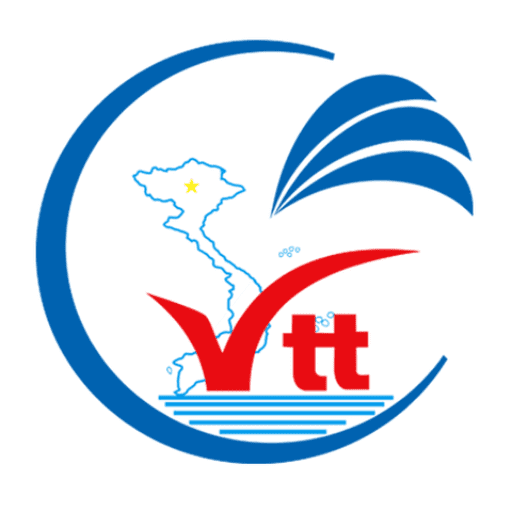Discovering the Hidden Gems of Vietnam Rural Tourism – A Journey into Tradition and Nature
Vietnam rural tourism is not just about visiting picturesque landscapes; it’s an immersive experience that intertwines the uniqueness of cultural heritage with breathtaking natural beauty. As travelers seek authentic experiences, this sector of tourism in Vietnam offers a delightful escape from urban chaos and an opportunity to connect with both the land and its people. The charm of rural Vietnam lies in its simplicity, where every hill, river, and local market tells a story waiting to be discovered.
Table of Contents
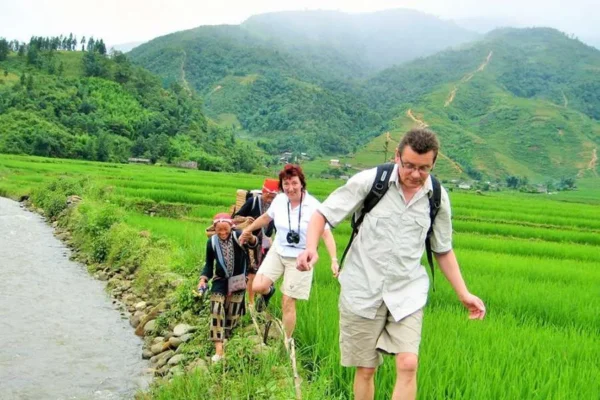
The Potential of Vietnam Rural Tourism
The emergence of rural tourism in Vietnam is a golden opportunity for economic growth and cultural preservation. With its temperate climate, stunning natural landscapes, and simple lifestyle, the countryside presents tourists with real experiences that bring them closer to everyday life. The development of rural tourism aligns with the global call for sustainable tourism practices, emphasizing responsible travel that benefits both visitors and local communities in Vietnam Rural Tourism
Stunning Natural Landscapes
Vietnam is blessed with diverse and beautifully preserved natural environments. From terraced rice fields in Sapa to verdant banana plantations in the Mekong Delta, the landscapes are stunningly picturesque. The pristine rivers and peaceful mountains serve as backdrops for activities such as hiking, swimming, and kayaking in Vietnam Rural Tourism
Travelers can explore vast emerald rice paddies while witnessing farmers engage in traditional agricultural practices. Witnessing sunrise over the hills or sunset illuminating the fields is a photographic moment that lingers in memory long after the journey ends. These natural wonders not only attract tourists but also encourage environmental responsibility among visitors, as they appreciate the ecosystem’s fragility in Vietnam Rural Tourism
Traditional Cultural Values
Rural tourism provides a unique avenue to delve into the rich tapestry of Vietnam’s cultural heritage. Each region has its distinct traditions reflected in art, music, food, and festivals. Local villagers offer insights into their daily lives, allowing travelers to understand the values that shape their culture.
For instance, participating in traditional craft workshops—such as pottery in Bat Trang or weaving in ethnic minority villages—brings travelers closer to the skills passed down through generations. Additionally, seasonal festivals celebrate age-old customs, enabling tourists to witness vibrant performances and mouth-watering cuisine. Such interactions foster a deeper appreciation for the resilience and creativity of local communities in Vietnam Rural Tourism
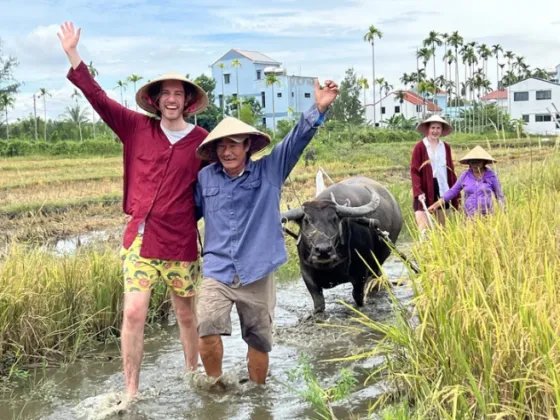
Types of Vietnam Rural Tourism
The beauty of rural tourism in Vietnam lies in its several forms that cater to various interests. Whether you are looking for adventure, relaxation, or cultural immersion, there’s an option for everyone in Vietnam Rural Tourism
Experience-Based Tourism
Experience-based tourism emphasizes hands-on participation in local activities. Tourists engage directly with the environment and community by learning how to cultivate crops, prepare traditional dishes, or participate in festive events.
This kind of engagement creates lasting memories and nurtures a bond between visitors and locals. For example, spending a day in a farming village allows tourists to harvest vegetables or plant rice, contributing meaningfully to the local economy while gaining insight into the agricultural cycle.
Ecotourism
Ecotourism focuses on preserving natural areas and promoting sustainability. Vietnam’s rural regions are home to rich biodiversity and unique ecosystems, making them ideal for ecotourism initiatives.
Visitors can embark on guided nature walks through lush forests, bird watching in wetlands, or exploring wildlife in protected reserves. Not only does this type of tourism enhance awareness of environmental conservation, but it also fosters appreciation for the interconnectedness of all living things.
Cultural Tourism
Cultural tourism is about immersing oneself in the local way of life, understanding traditions, and celebrating diversity. In rural Vietnam, this can include participating in traditional crafts, attending folk dance performances, or experiencing rituals during important festivals.
Each encounter presents an opportunity to engage with local artisans, share stories, and develop friendships. Travelers often return home with souvenirs crafted by hand, representing their unforgettable experiences and stories of the people behind them.
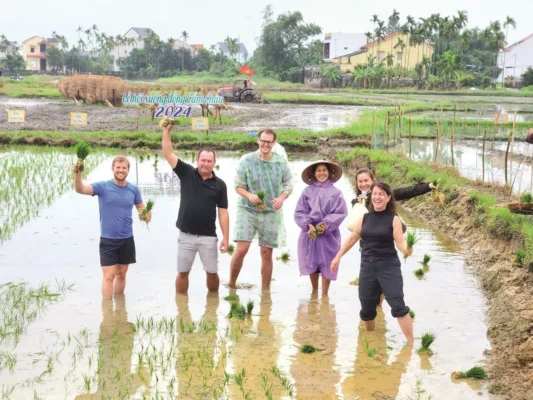
Remarkable Destinations in Vietnam Rural Tourism
Vietnam boasts an array of remarkable destinations perfect for rural tourism enthusiasts. From charming villages to breathtaking natural parks, each location offers something uniquely enchanting in Vietnam Rural Tourism
Traditional Craft Villages in Northern Vietnam
The northern region of Vietnam features several traditional craft villages that showcase centuries-old artisanal techniques. Bat Trang is renowned for its exquisite ceramics, where artisans create beautiful pots and vases that have graced households for generations.
Visitors can participate in pottery-making workshops, learning from skilled craftsmen who share knowledge of glazes and firing techniques. Other notable villages focus on silk weaving, bamboo crafts, and traditional embroidery, ensuring that tourists leave with cherished handmade souvenirs and a deeper connection to Vietnamese heritage.
Lush Green Fields of the Mekong Delta
The Mekong Delta captivates visitors with its winding rivers, lush green fields, and floating markets. This region is a hub for agriculture, producing fruits, vegetables, and rice. Exploring the delta means cruising along waterways on a traditional boat, visiting local families, and savoring fresh produce straight from the farm.
The vibrant atmosphere of floating markets pulsates with life as vendors sell colorful tropical fruits and handmade goods from their boats. Engaging with locals in the delta allows for a glimpse into the harmonious relationship between people and nature, showcasing the importance of sustainable practices.
Cultural Heritage in Central Vietnam
Central Vietnam is home to several UNESCO World Heritage Sites, including the ancient town of Hoi An and the imperial city of Hue. Hoi An, with its well-preserved architecture, vibrant lanterns, and mouthwatering cuisine, invites travelers to stroll through narrow streets filled with history.
Participating in local cooking classes teaches tourists how to prepare iconic dishes like Cao Lau and Banh Mi, blending flavors that reflect the region’s multicultural influences. Festivals held throughout the year, such as the Full Moon Festival, allow visitors to immerse themselves in the lively celebrations that honor tradition and community.
Impact of Rural Tourism on Local Economy
The rise of rural tourism in Vietnam is significantly transforming local economies, bringing both opportunities and challenges.
Increasing Income for Locals
One of the most immediate impacts of rural tourism is the increase in income for local residents. As more tourists visit rural areas, local businesses thrive, leading to job creation and improved livelihoods.
Farmers and artisans can sell their products directly to visitors, eliminating intermediaries and increasing profit margins. Moreover, local homestays and guesthouses provide additional sources of income, allowing families to benefit from hosting travelers. This newfound economic stability empowers communities to invest in education, healthcare, and infrastructure.
Infrastructure Development in Vietnam Rural Tourism
With the growth of rural tourism comes the need for improved infrastructure. Roads, transportation, and communication networks require attention to accommodate increasing visitor numbers.
Government and private investments in infrastructure enhance accessibility to remote areas, making it easier for tourists to explore off-the-beaten-path locations. Improved facilities, such as sanitation and waste management systems, contribute to healthier communities and protect the environment, ensuring that rural tourism remains sustainable.
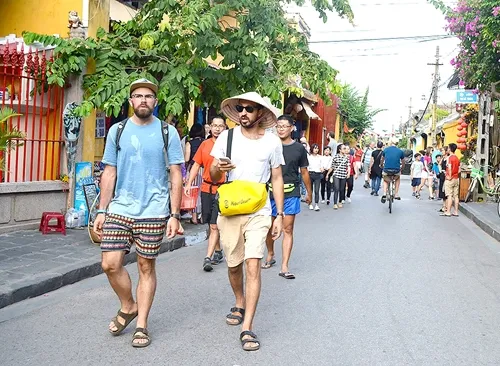
Sustainable Development Strategies in Vietnam Rural Tourism
To harness the potential of rural tourism while minimizing negative impacts, Vietnam has implemented various sustainable development strategies.
Government Support Policies
The Vietnamese government recognizes the significance of rural tourism as part of its national development plan. Initiatives to promote rural tourism include funding programs, marketing campaigns, and training for local communities to develop tourism-related skills.
Furthermore, hosting international conferences, such as the upcoming Global Conference on Rural Tourism scheduled for 2024, aims to draw attention to Vietnam’s commitment to sustainable tourism development while fostering collaboration among stakeholders.
Collaboration Between Communities and Businesses
Community involvement is crucial in developing successful and sustainable rural tourism. By working together with local businesses, tourism operators, and government agencies, rural communities can collectively address challenges and seize opportunities.
Establishing partnerships ensures that tourism benefits all parties involved, empowering locals to take ownership of their resources and environment. Additionally, businesses can promote responsible tourism practices that prioritize cultural respect and environmental conservation.
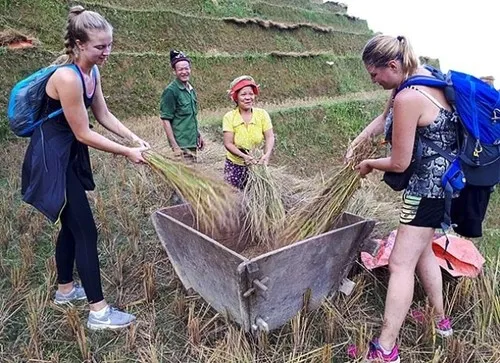
Preserving Culture and Environment Through Tourism
Rural tourism plays a vital role in safeguarding Vietnam’s cultural heritage and natural environment.
Safeguarding Cultural Heritage
As rural tourism flourishes, there is a growing awareness of the importance of preserving cultural traditions and practices. Engaging tourists in local customs helps sustain these traditions, ensuring they remain relevant and appreciated by future generations.
Cultural exchange encourages both visitors and locals to share their stories, enriching the overall experience. Participating in traditional arts and crafts helps revive waning skills, providing artisans a platform to showcase their work and pass knowledge onto younger generations.
Protecting Natural Habitats
The promotion of eco-friendly tourism practices significantly contributes to environmental protection. As tourists become more aware of ecological issues, they tend to embrace responsible travel options that minimize their footprint.
Initiatives such as wildlife conservation projects and reforestation efforts are increasingly integrated into rural tourism programs. This proactive approach engages visitors in meaningful activities that benefit the environment and inspire them to advocate for sustainability.
Connecting Visitors with Local Communities
A unique aspect of rural tourism is its ability to forge connections between visitors and local communities.
Real-Life Experiences of Rural Life
Participating in day-to-day activities alongside locals allows tourists to gain first-hand insight into rural life. Engaging in tasks such as planting rice, harvesting fruit, or preparing traditional meals fosters a sense of camaraderie and shared experience in Vietnam Rural Tourism
These genuine opportunities challenge preconceived notions of rural living, replacing stereotypes with personal narratives that reflect resilience and strength. Through these interactions, visitors often gain a profound appreciation for the struggles and triumphs faced by rural communities in Vietnam Rural Tourism
Participating in Traditional Festivals
Attending local festivals offers a colorful glimpse into the heart of a community. These events celebrate significant occasions, historical milestones, or religious beliefs, inviting visitors to join in joyous festivities.
Participation may involve traditional games, performances, or communal feasting, allowing tourists to partake in the local culture fully. Such involvement deepens connections and cultivates understanding and respect for diverse traditions.
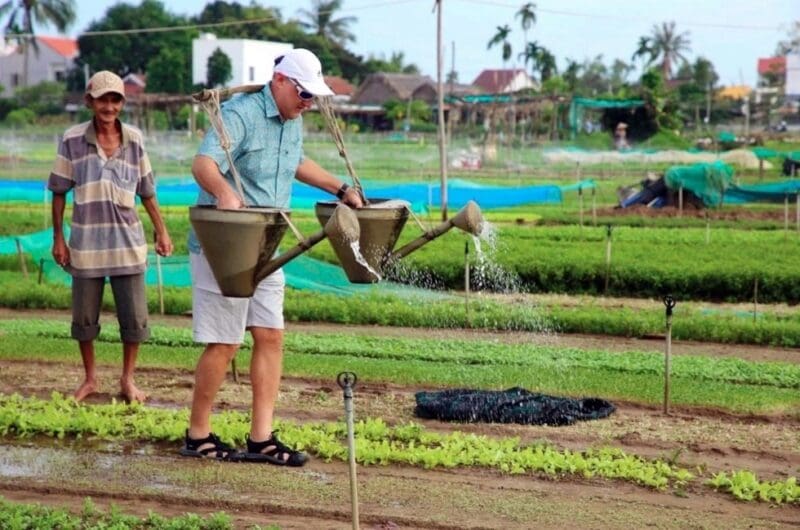
Challenges in Developing Rural Tourism
Despite its potential, rural tourism faces several challenges that must be addressed to ensure sustainable growth.
Resource Management
Managing resources effectively is essential to avoid overexploitation and maintain ecological balance. As visitor numbers rise, natural resources such as water, land, and energy may come under strain, jeopardizing both the environment and the communities that depend on them.
Sustainable practices, such as water conservation, waste recycling, and renewable energy usage, are imperative to mitigate these risks. Educating both tourists and locals about responsible resource management is crucial to fostering a culture of sustainability.
Balancing Trade and Preservation
Striking a balance between commercialization and cultural preservation poses a significant challenge. As demand for rural tourism grows, there is a temptation for communities to prioritize profit over cultural integrity, risking the very essence that attracts visitors in the first place.
Ensuring that tourism development aligns with cultural values requires careful planning and collaboration. Encouraging respectful tourism practices that honor local customs and traditions can help preserve authenticity while still generating economic benefits.
Future Trends in Rural Tourism in Vietnam
As rural tourism continues to evolve, several trends will shape its future development in Vietnam.
The Role of Technology
Technological advancements open new avenues for promoting rural tourism. Digital platforms enable local communities to market their offerings globally, connecting them with a broader audience.
Social media, travel blogs, and tourism websites play a crucial role in highlighting lesser-known destinations, showcasing unique experiences, and sharing captivating stories. Investing in technology training for rural entrepreneurs can empower them to utilize these tools effectively.
Enhancing Online Promotion
With the increasing reliance on online research and booking, enhancing digital marketing strategies is essential. Investing in targeted online advertising, creating engaging content, and leveraging user-generated reviews can help attract more tourists to rural areas.
Collaboration with travel influencers and bloggers can amplify visibility and reach diverse demographics, capturing the attention of adventurous travelers seeking authentic experiences.
The Role of Community in Rural Tourism Development
The success of rural tourism hinges on community involvement and active participation.
Encouraging Local Participation
Engaging locals in tourism planning and decision-making processes empowers communities to voice their needs and aspirations. By involving residents, tourism initiatives can be tailored to reflect local interests and priorities, ensuring mutual benefits.
Participatory approaches build trust and cooperation between community members and tourism stakeholders, fostering a sense of ownership and pride in their cultural heritage.
Creating Community-Based Tourism Models
Developing community-based tourism models that highlight local strengths ensures that tourism remains economically beneficial for residents. These models can encompass various offerings, such as guided tours led by locals, workshops showcasing traditional crafts, and culinary experiences that feature regional specialties.
By prioritizing community engagement, rural tourism can flourish sustainably while preserving cultural identity and providing equitable economic opportunities.
International Collaboration Opportunities in Vietnam Rural Tourism
Drawing from successful international experiences can enhance Vietnam’s rural tourism landscape.
Collaborating with International Organizations in Vietnam Rural Tourism
Partnering with international organizations focused on sustainable tourism can facilitate knowledge exchange and capacity building. Programs that emphasize best practices and lessons learned from other countries can guide Vietnam in implementing successful rural tourism strategies.
Such collaborations can also support funding opportunities for projects aimed at improving infrastructure, promoting environmental conservation, and enhancing community welfare.
Sharing Experiences from Other Countries in Vietnam Rural Tourism
Studying successful rural tourism models in other nations can inspire innovative approaches and solutions to common challenges. Countries known for their thriving rural tourism, such as Thailand and Italy, provide valuable insights into creating authentic experiences that resonate with travelers.
Exchanges between Vietnamese stakeholders and their international counterparts can lead to collaborative efforts that enrich Vietnam’s rural tourism offerings.
Exciting Activities in Vietnam Rural Tourism
Rural tourism in Vietnam promises a wealth of exciting activities that leave lasting impressions on visitors.
Harvesting Produce with Farmers
One of the most enriching experiences involves joining local farmers in the fields during harvest time. Participants can learn about sustainable farming practices, assist in gathering crops, and enjoy the fruits of their labor in delicious meals prepared by host families.
These hands-on experiences create a connection to the land and appreciation for agricultural practices that have sustained communities for generations.
Participating in Craft-Making Processes
Engaging in traditional craft-making processes showcases Vietnam’s rich artistic heritage. Tourists can try their hand at weaving, pottery, or painting under the guidance of skilled artisans.
Such experiences not only provide insight into the craftsmanship but also offer the opportunity to create personalized souvenirs that reflect the unique culture of the region.
Assessing the Importance of Vietnam Rural Tourism
Rural tourism holds immense value in contributing to Vietnam’s economy and social fabric.
Economic Value
The economic impact of rural tourism is significant, fostering job creation and stimulating local economies. As communities embrace tourism, they diversify their revenue streams, reducing dependency on traditional industries.
The resulting economic growth supports infrastructure development, enhances public services, and ultimately improves the quality of life for residents.
Social and Cultural Value
Beyond economic advantages, rural tourism strengthens social bonds and cultural identities. It encourages intergenerational exchanges, reviving interest in traditional customs and practices. Communities united by the shared goal of preserving their heritage foster pride and resilience, ensuring that cultural legacies endure.
Moreover, the cross-cultural interactions between tourists and locals nurture understanding and appreciation for diversity, bridging gaps between different backgrounds.
FAQs Vietnam Rural Tourism
- What are the best places to visit for rural tourism in Vietnam?
- Some popular destinations include Sapa, the Mekong Delta, Hoi An, and traditional craft villages in Northern Vietnam.
- How can I participate in rural tourism activities?
- Many local tour operators offer packages that include activities such as farming experiences, cooking classes, and craft workshops. You can also look for community-based initiatives that welcome visitors.
- Is rural tourism environmentally friendly?
- When managed responsibly, rural tourism can promote sustainability by encouraging practices that protect natural habitats and resources while supporting local economies.
- What should I expect when visiting rural areas?
- Expect warm hospitality, the chance to engage with local culture, and opportunities to learn about traditional practices. Be prepared for varying levels of comfort and amenities relative to urban settings.
- How can I ensure my visit is beneficial to the local community?
- Choose responsible tour operators, support local businesses, and engage in community-led initiatives. Prioritize authentic experiences that respect cultural practices and promote sustainability in Vietnam Rural Tourism
Conclusion About Vietnam Rural Tourism
In conclusion, Vietnam rural tourism stands at a crossroads of opportunity and responsibility. It offers a gateway to discover the rich cultural landscape, breathtaking nature, and resilient communities that define Vietnam’s countryside. Through sustainable practices, community engagement, and international collaboration, rural tourism can thrive while preserving the unique heritage of this enchanting nation. As travelers, we hold the power to transform our experiences into genuine connections, advocating for sustainable tourism that creates lasting benefits for both ourselves and the communities we visit. Embrace the spirit of adventure, connect with local cultures, and contribute to shaping a brighter future for Vietnam rural tourism.
Amidst countless options, you are probably looking for a travel company that truly understands Vietnam to turn your dream of exploring this S-shaped land into a reality. We, a local travel company in the heart of Vietnam, are proud to be natives of this land, carrying within us a love and deep understanding of every corner and every unique cultural aspect. Different from international travel companies, we don’t just offer tours; we share the most authentic and intimate experiences with Vietnamese life and people. You will discover famous destinations such as the majestic Ha Long Bay, the poetic ancient town of Hoi An, or the serene Imperial City of Hue from a local’s perspective
We understand that when setting foot in a foreign country, dedicated and timely support is extremely important. Therefore, our support team is always ready 24/7 throughout your journey in Vietnam, answering all your questions and assisting you in every situation. Moreover, with full licenses to organize domestic and international tours issued by the Vietnamese government, you can be completely assured of our prestige and service quality. Contact us today for the most professional and dedicated consultation, and let’s plan an unforgettable and complete trip to Vietnam together
Contact Us Now !
WhatsApp 1 : +84 965 251 618
WhatsApp 2 : +84 989 248 646
Email: info@vietnamtour.travel
support@vietnamtour.travel
Website: www.vietnamtour.travel
• Hanoi Office: No. 3, Ngo 225 Luong The Vinh Street, Trung Van Ward, Nam Tu Liem District, Hanoi
• Ho Chi Minh City Office: Room 503, 5th Floor, C4 Building, Gia Khang Apartment Complex, 38 Street, Ward 14, Go Vap District, Ho Chi Minh City
